The MSI Spatium M580 FROZR is a Gen5 SSD with a large heatsink designed to keep thermals to a minimum while offering speeds that allow it to compete with other top-end drives. As more PCI-E 5.0 SSDs hit the shelves, drives like the Spatium M580 need to provide solid thermal solutions or insane speeds to stand out. While we’ve seen from our M570 FROZR review that the heatsink method does work, we’ve tested this drive rigorously to see if the speeds of the M580 FROZR beat out other strong SSDs already on the market.
SSDs like the Corsair MP700 Pro SE and Crucial T705 offer insane speeds up to the 14000MB/s mark, much like MSI advertises with the M580 FROZR. However, these alternative drives don’t have the rather garish cooling solution in comparison, which raises questions about which drives are the best. To figure this out, we’ve reviewed the MSI Spatium M580 FROZR in full with an assessment of the specs, design, and performance.
Buy the MSI Spatium M580 FROZR on:
Specification
From a glance at the specs, the MSI Spatium M580 FROZR looks to be similar to its M570 Pro sibling. The significant difference between these two drives is the read and write speed, with MSI advertising up to 14600MB/s on the reads and 12700MB/s on the writes. It’s worth noting that this is only available for the 2TB capacity version of the M580; both the 1TB and 4TB variants are slightly slower in comparison.
The read and write speeds are the standout specs of this drive, as the advertised ratings make the M580 FROZR one of the fastest Gen5 SSDs on the market. While the M570 Pro is a solid option, the M580 looks to be one of the best SSDs on the market purely based on its speeds, competing with the Corsair MP700 Pro SE and Crucial T705.

Although we’re specifically looking at the 2TB version today, the 1TB and 4TB capacities are worth considering based on your storage needs. The 4TB version is close to the 2TB drive based on speeds.
| Specification | MSI Spatium M580 PRO FROZR |
|---|---|
| PCI-E Generation | Gen5 |
| Capacity | 1TB, 2TB, 4TB |
| Sequential Read Speed | 1TB: 13700MB/s 2TB: 14600MB/s 4TB: 14100MB/s |
| Sequential Write Speed | 1TB: 10300MB/s 2TB: 12700MB/s 4TB: 126000MB/s |
| Warranty | 5 years |
| Endurance | 1TB: 700TBW 2TB: 1400TBW 4TB: 3000TBW |
| Form Factor | M.2 2280 |
Speeds aside, the Spatium M580 FROZR has a five-year warranty or covers the drive up to its maximum TBW (terabytes written). Most manufacturers only tend to offer a blanket number of years for the warranty, so it’s great to see MSI offering scope beyond the standard five years we see with most other SSDs.
Although we haven’t included this in the table, the MSRP of this drive will be a significant point of contention for most prospective buyers. The MSI Spatium M580 FROZR 2TB, at the time of writing, is around $320. Considering most 4TB Gen4 drives can be purchased for less than $300, there’s a significant price premium on Gen5 drives that won’t be worth it for price-conscious builders.
Compared to other Gen5 SSDs, the MSI Spatium M580 FROZR sits in the middle regarding pricing. The Crucial T705 (non-heatsink model) is cheaper, sitting below the $300 mark, while the Corsair MP700 Pro SE is around $350. However, the exceptional performance of the MSI Spatium M580 FROZR might make the high price point easier to swallow.
Suggested Article: MSI Spatium M570 PRO FROZR SSD Review
MSI Spatium M580 FROZR Design
M.2 SSDs tend to be a bit bland on the design front, primarily because if we’re reductive, they’re just a tiny strip of PCB with a microcontroller and flash chips. However, the MSI Spatium M580 FROZR, much like its M570 counterpart, is more interesting due to its large heatsink. The massive stack of heatsink fins and heat pipes is MSI’s attempt to control thermals with a passive solution.

While the passive solution is highly appreciated compared to some noisy fans we’ve seen on other drives like the ADATA Legend 970, this heatsink is still glaringly large. Measuring 71.65mm tall, the MSI Spatium M580 FROZR is one of the largest SSDs we’ve seen. Furthermore, getting it installed into our benchmarking system required additional accessories.
MSI notes on their webpage for this drive that the large stature shouldn’t have any compatibility issues with graphics card backplates. I appreciate this sentiment on certain motherboards, but this isn’t always the case because many manufacturers place the primary Gen5 SSD and GPU slot very close together. We used the ASUS ROG HYPER M.2 card to install the drive, which offers a handy fix for those without space close to the graphics card. However, this meant the top of the Spatium M580 FROZR was exceptionally close to the bottom of the case, which may pose issues for those with a smaller chassis.

Aesthetically, the look of the M580 hasn’t grown on me since reviewing the M570 PRO. The heatsink is an exciting solution that works and results in a significantly lower noise floor compared to an SSD with a fan. But the mass of raw, uncoloured aluminium heatsink fins and pipes doesn’t look great. A black or white drive would blend in much better in a PC build. Considering this SSD’s cost, some additional aesthetic features would make the Spatium M580 stand out more than other drives that don’t offer anything on the design front.
Do You Need to Upgrade to Gen5 Storage?
PCI-E 5.0 SSDs, while expensive, are the best-performing options on the market. Gen5 drives are worth picking up for enthusiast PC builds because they are the crème de la crème of performance. Offering speeds up to 14000MB/s, these SSDs are ideal for intense tasks that require the best performance money can buy. However, with so many Gen5 SSDs hitting the shelves within the past year, all of which will eventually phase out Gen4 options, is it worth upgrading right now?
In short, the answer is no, but it may be worth upgrading sooner than you think. As it stands, Gen4 SSDs are remarkably price competitive and provide outstanding performance across the board. Most gaming or workstation PC builds won’t require read and write speeds above 7000MB/s. For this reason, picking up a Gen4 SSD over Gen5 will be better for the vast majority of prospective buyers.

From a gaming standpoint, not even Gen4 is a requirement nowadays because there aren’t many games that utilise the full capability of these drives. While Microsoft’s DirectStorage API is slowly being integrated into modern titles (and this requires a Gen4 SSD), the number of games currently using it is less than 15.
However, as the prices become more tolerable and games become more demanding, we may see the scales shift in favour of Gen5 options. It took about three years for Gen3 and Gen4 prices to reach an equilibrium, and we can expect a similar amount of time for Gen5 SSDs. This doesn’t mean Gen5 SSDs should be disregarded, as their performance is currently unrivalled. However, those looking to pick up affordable storage can secure a Gen4 drive as pricing and performance are highly competitive.
Thermals
All of the SSDs that we test are benchmarked using CrystalDiskMark and HWInfo. CrystalDiskMark applies a synthetic load on the drive, providing a numbered result showing the read and write speeds. While doing this, HWInfo shows the drive temperatures during the whole test, which gives us an idea of how the MSI Spatium M580 will perform in similar workloads.
During our tests, the MSI Spatium M580 FROZR hovered around 44 and 47 degrees Celsius, sustaining high read and write speeds. So these are the temperatures you’d see in a significant file transfer or when a file is exported and encoded. During the random read-and-write tests, the Spatium M580 FROZR provided an average of 34 degrees Celsius, which aligns with what we saw in the review of the M570 PRO. Temperatures fluctuated slightly in other benchmarking runs, but the large heatsink is doing a solid job of maintaining low thermals.

Performance
To assess the read and write performance of any SSD, we use CrystalDiskMark. This application is renowned for providing solid data and always returns consistent numbers for sequential read and write speeds. We use the stock settings to test drives with a 1GiB file, and CrystalDiskMark will conduct five passes, which return and update the speed with every pass.
In this benchmarking run, CrystalDiskMark reported a max speed of 14075MB/s on the reads and 12020MB/s on the writes. While this is impressive, it isn’t quite the advertised speeds that MSI notes on their website, which are 14600MB/s and 12700MB/s. We’re seeing a loss of 500MB/s on the reads and 700MB/s on the writes, which is a fairly significant difference.

While these results are within the 10%+- margin for error that we allow, this gap is surprising. It’s worth noting that MSI states that the Spatium M580 FROZR can reach ‘up to’ these speeds, but if we compare our data to the M570 FROZR, the performance difference is effectively negligible. Most SSDs tend to see a 50-100MB/s loss or gain in performance compared to their advertised speeds, so this drive seems like an anomaly.

To confirm consistent results, we tested the M580 FROZR a few more times to ensure the data was accurate. During our second run, Crystal Disk Mark reported a further loss with the Spatium M580 FROZR down to 14005MB/s. Ultimately, we’re not saying that the results here are gospel, but our data is showing that the reported speeds are closer to 14000MB/s and 12000MB/s as opposed to 14600MB/s and 12700MB/s, which aligns it with the MP700 Pro SE.
Compared to other SSDs we’ve reviewed, the MSI Spatium M580 FROZR is one of the best-performing drives available. Its high speeds are nothing to frown at, and we’re impressed with the overall performance. However, much like the M570 PRO FROZR, the large heatsink will be a point of contention for many, mainly because other drives can reach similar speeds without passive or active cooling.

Conclusion
MSI Spatium M580 FROZR

Product Name: Spatium M580 FROZR
Brand: MSI
-
Design
-
Thermals
-
Performance
-
Value For Money
Summary
The MSI Spatium M580 FROZR is one of the strongest Gen5 SSDs, offering speeds that hover around 14000MB/s and 12000MB/s. As expected, while it doesn’t do much from an aesthetic point of view, the large heatsink is more than capable of keeping thermals to a minimum and providing great temperatures across our testing. Compared to the M570 PRO FROZR, I feel the M580 FROZR is a better drive based on its high performance, which aligns it with other top-end drives such as the Corsair MP700 Pro SE, and Crucial T705.
The only significant disappointment of the M580 FROZR is that the performance isn’t quite what we expected. From our data, CrystalDiskMark reported around a 600MB/s and 700MB/s loss across the reads and writes, respectively. While this isn’t an exceptionally negligible loss, these aren’t the speeds we were hoping to see, and this affects the overall value proposition that this drive offers, making it harder to compete with existing Gen5 options.
Pros
✅ Great thermals
✅ High speeds
✅ No included fan
Cons
❌ Doesn’t hit advertised speeds
❌ Heatsink colour
❌ Clearance issues


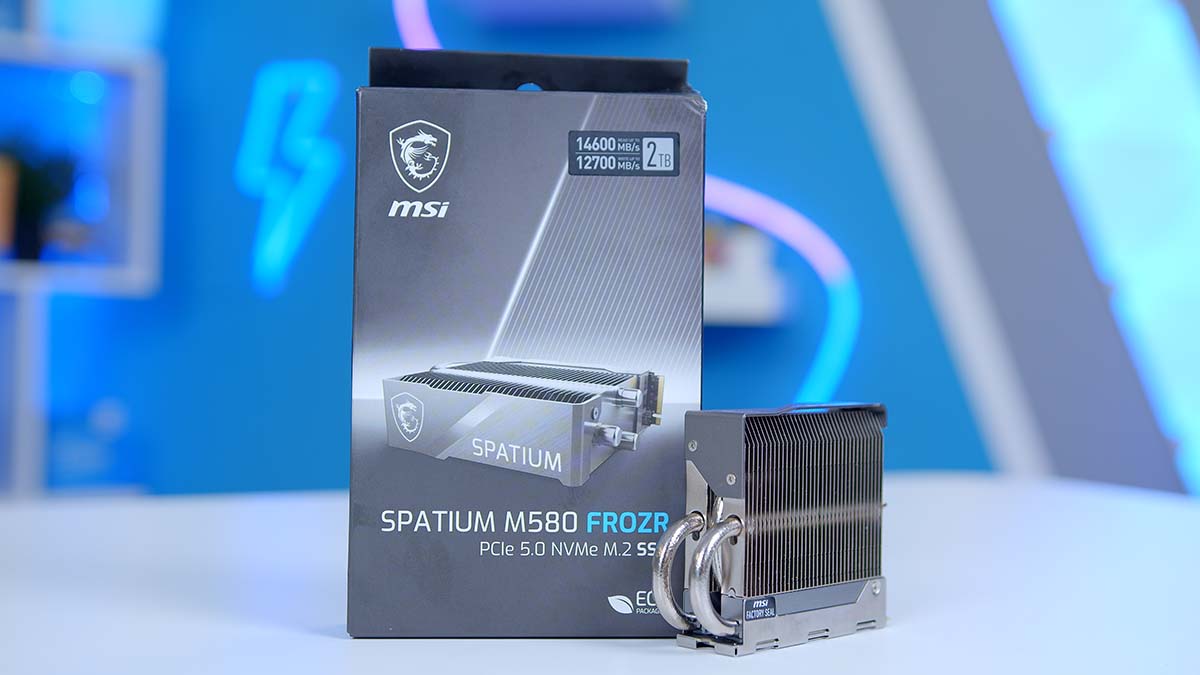
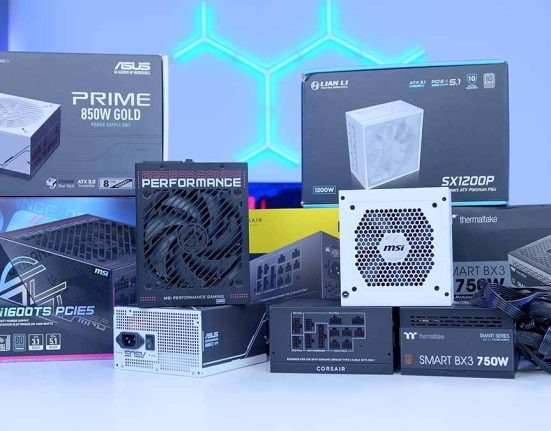
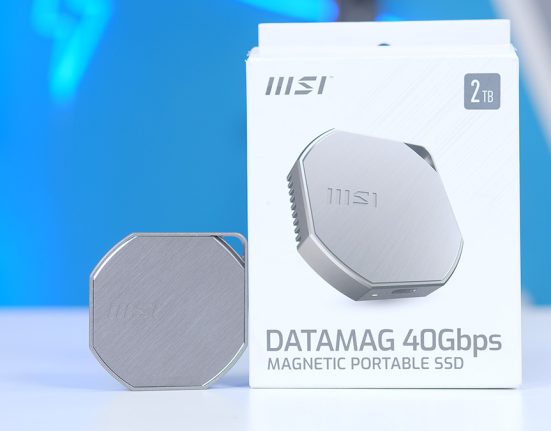

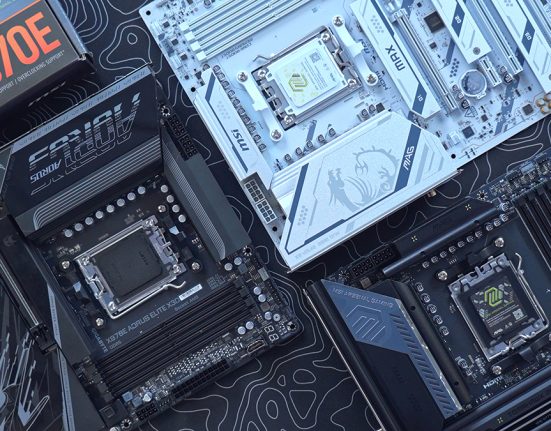
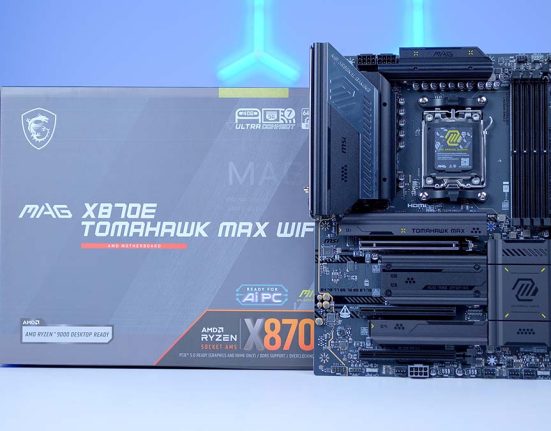
![FI_[DP056] Antec flux M + 9060XT](https://geekawhat.com/wp-content/uploads/2025/12/FI_DP056-Antec-flux-M-9060XT-551x431.jpg)